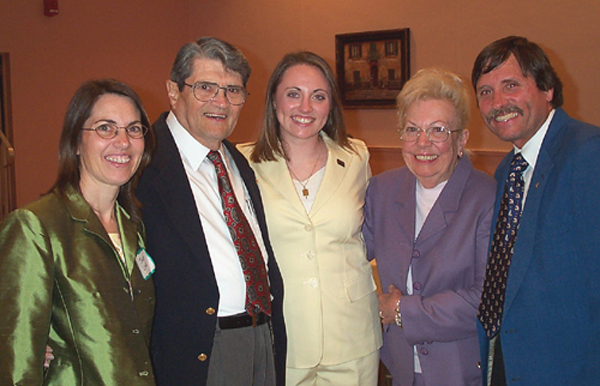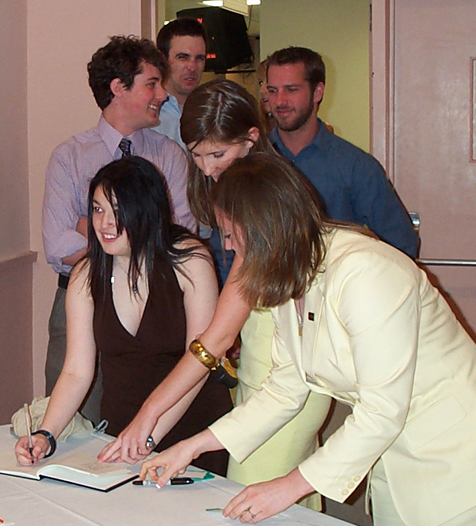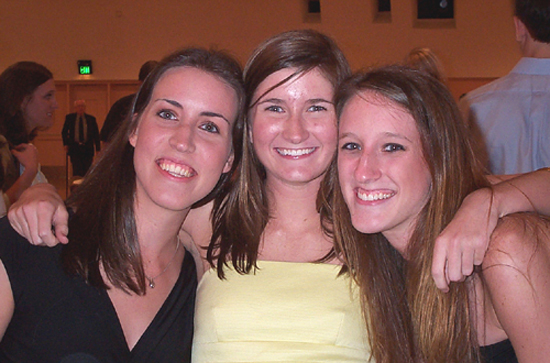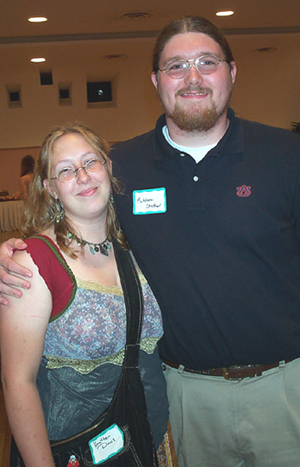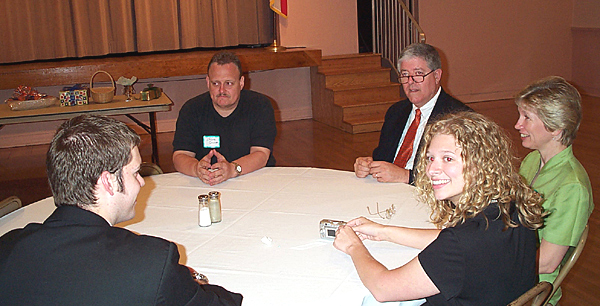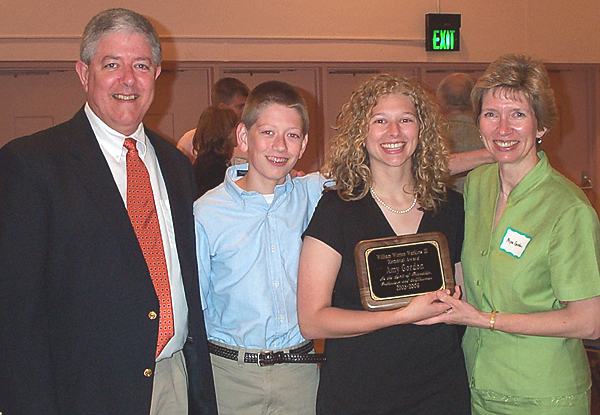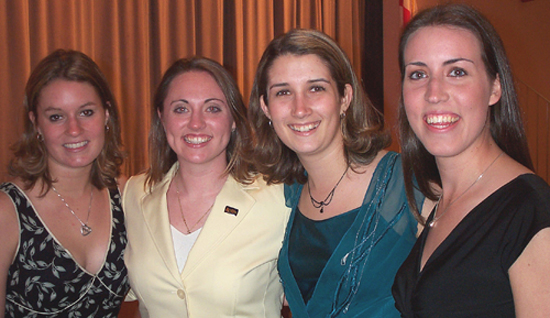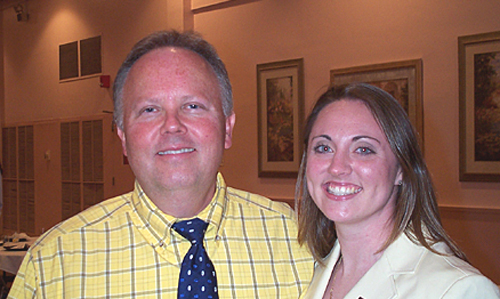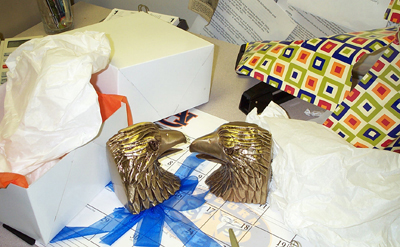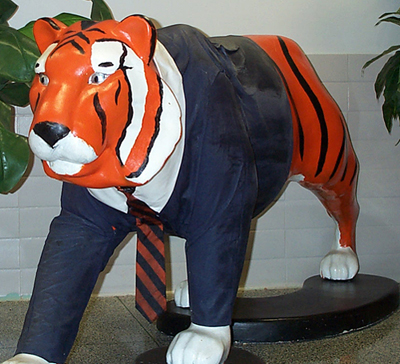
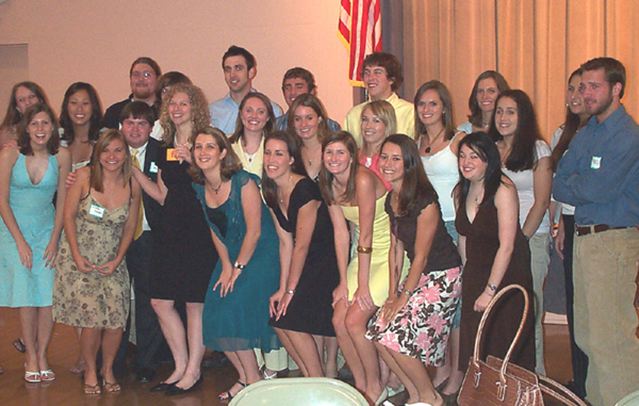
The Auburn
Plainsman

2006
banquet
May 1, 2006
Web page and photos by
Ed
Williams
Department of
Communication
and Journalism
Plainsman faculty adviser
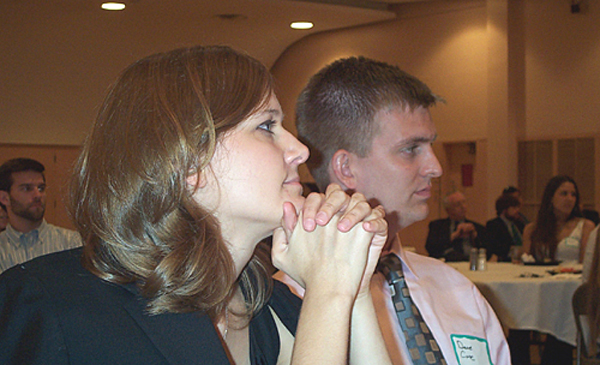
Guest speaker
Rachel Davis, 2000-2001 editor, The Auburn Plainsman
Reporter, The Florida Times-Union, Jacksonville, Fla.
Rachel Davis Online
Click here
Good
Evening.
I want to tell you
how honored and excited I am to be here,
back home where it all started for me in journalism. I must confess
though, when April called me a couple months ago to ask if I’d speak at
your year-end banquet my first thought was “Sure.” Then I got nervous.
It was only five years ago that I delivered my farewell speech as
editor of the Auburn Plainsman, and there are leagues of people out
there who have a broader prospective on the world of journalism.
They must not have been available tonight. So, tonight you’re stuck with me, one who is still straddling that line between college student and adult, family funded and gainfully employed. I’m still trying to figure out where I fit, and hopefully you can garnish some grain of import after listening to a 27-year-old rattle off thoughts on the institution and tradition I learned from and continue to love.
I remember almost
everything about this night five years ago: how
relieved I was that we’d manage to put to bed the 107th volume of the
university’s history despite our Monday night fusses at editorial board
meetings and Wednesday deadline stresses. I remember how excited I was
to be heading to Jacksonville, Fla., to try “real” newspaper
journalism. And I remember how unfair it seemed that just as a rag-tag
group like ourselves were coming together as a team we found ourselves
here, in this room, saying goodbye. I image some of you, especially you
seniors, may be struggling in your seats with similar conflicts tonight.
In the years since, I’ve been able to reflect on that banquet night and
the year of nights that preceded it as our staff worked tirelessly to
write another year in Auburn’s history. I knew at the time working at
The Plainsman was the best thing I ever did at Auburn. But I know now
it’s the best thing Auburn ever did for me.
Here’s what I learned after I left the 2001 Plainsman year-end banquet:
1. Journalism is a freakin’ blast: I mean I can’t believe the list of stories my editors turned me loose on in my first two years at the paper are nothing short of amazing. They sent me to New York the day after Sept. 11, 2001. They sent me to Puerto Rico when our Navy went down there to train before the country went to war in Afghanistan. And when they went to Afghanistan, we went too. We covered the Jacksonville-based USS John F. Kennedy, one of the Navy’s oldest aircraft carriers, but one of the coolest ships I’ve ever seen in my life. It is a floating city with this maze of passageways and portholes. It was loud and smelled of oil and jet fuel and each time an F/14 Tomcat or F/18 Hornet fighter was catapulted off the top deck my bunk bed rocked. The photographer and I didn’t get much sleep on that trip. But then again, reporting is not a nine-to-five job if you do it right.
Covering the Kennedy
during the war in Afghanistan was wild, but my
favorite trip came when the U.S. turned its war guns on Iraq. I’d been
covering the military for a little over a year I believe at the time
and the run up to the Iraqi war had already started. The Pentagon was
making plans to try something new with this conflict and they started
taking names of reporters and photographers who were interested in
“embedding” with the troops. They assigned reporters to military units.
The idea was for them to sleep, eat and breathe war with the soldiers
they were with. Jacksonville is a huge military town. Tons of retirees.
Three naval bases. One Marine Corps base. And the headquarters of the
Florida National Guard is just 30 minutes south of our downtown.
Needless to say we
wanted to be a part of it so I went about getting
our name on that list. We were notified on a Monday around 2:30 a.m.
that the military had a spot for us on the last flight aboard an
aircraft carrier if we could get to Crete, a tiny island in the
Mediterranean Sea, by noon Wednesday. If we missed that flight, there
wouldn’t be another one for at least a couple weeks. The ship would
shut down any cargo flights and they’d go into war-mode with only
mission specific aircraft operating from its flight deck. I hung up the
phone with the military official and dialed the number to wake my
editor. He dialed to wake his editor and she dialed to wake her editor.
By 11 a.m. the
photographer and I were packed and boarded on a plane
bound for the USS Harry S. Truman, one of the Navy’s newest aircraft
carriers. To this day I think the only reason we managed to get aboard
that ship (and avoid the hemming and hawing of editors tossing out
words like insurance and liability) was because nobody had time to
think about it. We landed on board the Truman the night the air war
campaign began in Iraq. We sat in the ready room with pilots as they
got their orders and their targets in Northern Iraq. We were debriefed
on how successful they were when they returned to the ship the next
morning. We watched other ships in the carrier’s strike group launch
Tomahawk missiles that lit up the wide-open ocean. In the distance you
could see a hint of land. Our country was at war and I was watching it.
Not on the TV, but live and up close. I wrote down everything: the heat
of a jet’s engines as it revved before take-off, the brightness of the
full moon that lit up the flight deck, watching the fighter jets take
off loaded down with bombs and watching them land eight hours later
empty.
For all the fun that covering the military was, it has been the last three years I’ve enjoyed at the paper the most. I moved to general assignment about that long ago and started writing stories about people, regular folks who were living life on the bottom, the top or like most of us in between. I’ve gotten to talk to people who were in some of the most poignant and pivotal points in their lives: a polish priest on the morning of Pope John Paul II’s burial and a family who’d just lost everything they had, including their father, to the vicious floodwaters of Hurricane Katrina. I’ve hung out with marine biologists who migrate with endangered Right Whales along the coasts of Florida and back to Maine, making sense of the habits of one of the world’s most mysterious mammals. I got to write about three people – a prostitute, a thief and a drunk – who were buried on the same day without flowers, without prayers and without friends or family. Journalism, whether it happens at the county commission meeting in small town Palatka, Fla., or the deck of a naval warship halfway across the world can be rewarding.
2. The second lesson I learned after leaving here was how to act like I knew what I was doing even if I didn’t have a clue. If it happens to you when you leave here, which it will, my advice to you is to figure it out really quick. Those of us who worked at the Plainsman thought we knew so much about journalism because we spent more hours in the Foy basement than we did anywhere else. And it showed, perhaps not in our grades, but in our swaggers. We just knew when our newspaper hit the stands on Thursdays every student, faculty member and administrator from the SGA office to Samford Hall was reading our work. Our heart. That’s what we gave it, our heart. But back to my point. We THOUGHT we knew a lot about journalism. My first beat at the Times-Union was the military. They hired me Sept. 7, 2001, to a beat that was basically full of feature stories and veterans affairs articles. Little did we know four days later that would all change. Four days later, their war correspondent would be a 22-year-old recent college graduate. I was tracking training schedules and deployments of hundreds of local units while still trying to figure out the difference between an Ensign and a Commander. Instead of covering welcome home parties, we covered a post-911, tight-lipped military, which made getting information an act of congress, literally. And I was scared. Here I was at this huge paper and they’d basically just thrown me to the wolves and trusted me to come back with a good story. They had no idea I was living in stress city and my cubical was the town square. Then I remembered my Plainsman swagger and applied it to real journalism. I made flashcards, I read trade magazines, I learned the lingo, I talked to experts. I got smart on everything military and a couple months into it – I remember this clear as day – a sailor, a petty officer 1st class, I was interviewing asked me how long I’d served in the military before I went into journalism. If you pretend long enough, the people around you start believing in you and you start believing in yourself.
3. With that being said the third lesson I figured out after I left the banquet, was that I learned more than I thought from my professors at Auburn. I admittedly shirked a couple Tuesday classes in favor of deadline at the Plainsman and I also shirked my share of class reading assignments. But it wasn’t until I left that an assigned reading in Ms. Shepherd’s feature class made sense. She gave us this magazine piece, written by Gary Smith, a reporter at Sports Illustrated. It defied all the traditional rules of journalism. The lead didn’t begin to answer all the who, what, why, where and how questions and there wasn’t a nut graph in sight. That story, though, introduced me to narrative journalism. The kind of journalism that doesn’t just relay information, it tells stories. It’s that story-telling technique that I try to mimic in almost every article I write for the Times-Union. It wasn’t until I got to the Times-Union that I understood why Mr. Williams pushed me what felt like harder than any other student in his reporting class. Listen to them – seniors, it’s probably too late for you. The rest of you, read their assignments, attend their classes then pave your own way. Don’t listen to them if they tell you you’re not good enough. Work harder. If you want to work in community journalism go do it. But do it better than anybody else. Your community deserves it. If you want to work at a metro daily go do it. But get active in figuring out how. Don’t wait for an internship, or a job for that matter, to fall in your lap. You have so much experience wrapped up in the years you’ve spent at the Plainsman. Figure out a way to make it work for you on the other side.
4. The fourth lesson – and I promise to wrap this up soon – the fourth thing I learned after I left the 2001 banquet: You never really leave. Although, I’m hundreds of miles away now, I still think about power hungry Auburn trustees, student walkouts and protests at the Alabama Capitol for a better Auburn. I still think about campus-wide votes of no confidence and a front page editorial calling for the resignation of every single trustee, because that fight continues. The same problems that plagued our university when we wrote about it, still plagues her today. I still think about the firing of University Presidents, the ascension of lackeys and liars to Samford Hall and the merging of the journalism department in an effort to squash the Plainsman’s voice. You still have that voice. You just have to use it. We didn’t win our fight, but we fought bravely. My hope is that you, those of you coming back next year, continue to hold the Student Government Association, the University Faculty, Dr. Richardson and the board accountable for every decision they make for your university. Your fellow students deserve nothing less. You are their voice. Let them be heard.
I’ve talked a lot about
what I’ve learned after I left this place. But
there was a lot that I learned while I was still here too. Take
advantage of the resource you have in your Plainsman. Make her work for
you. Challenge yourself down there. You and your university will be
better for it. We were.
Thank you.
Rachel Davis
General Assignment Reporter
Florida Times-Union
1 Riverside Avenue
Jacksonville, FL 32202
904.359.4614 work
904.359.4478 fax
800.472.6397 toll free
